Best of 2016: Classical | reviews, news & interviews
Best of 2016: Classical
Best of 2016: Classical
Bird music from dawn to midnight crowns another outstanding year
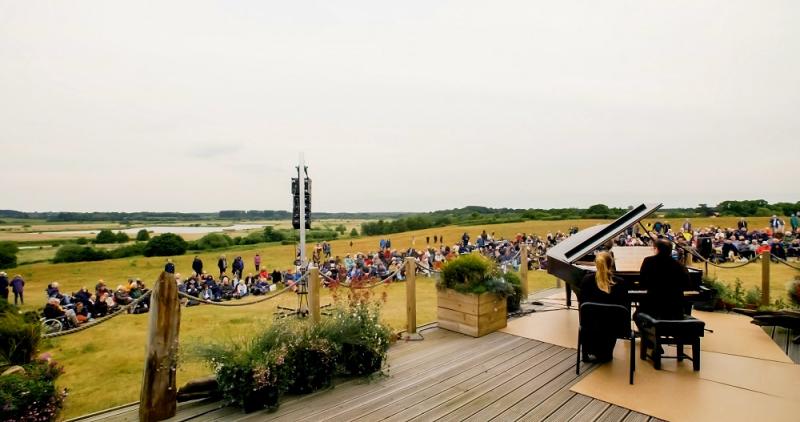
Revelations in the classical year never stop coming. Even the week before Christmas yielded two performances as good as you're going to get: the sheer effervescence and light-flourishing of Lucy Crowe in ecstatic Bach and Mozart with La Nuova Musica, and Sheku Kanneh-Mason in Haydn's C major Cello Concerto. So any sifting of 2016's musical riches needs to put the truly one-off packages at the top of the list.
In terms of unrepeatable magic and logistics that actually worked, watch the birdie for Pierre-Laurent Aimard's four Aldeburgh Festival concerts of Messiaen's Catalogue d'Oiseaux from 4.30am (audience members out on the Snape marshes pictured below) to midnight in locations including the Snape Maltings bar overlooking the marshes and an open-air platform on a hill - yes, they do have them in Suffolk - at Minsmere Bird Reserve. The most amazing connection came for me when, having heard what I thought were stridulations among the dawn chorus, they were confirmed in a talk before the final concert as the sounds of the grasshopper warbler. And yes, Messiaen does his own version of them. Helen Wallace also reeled at the circus setting for the Festival's roll-up opening, including a dizzying performance of Britten's Les Illuminations from Sarah Tynan.
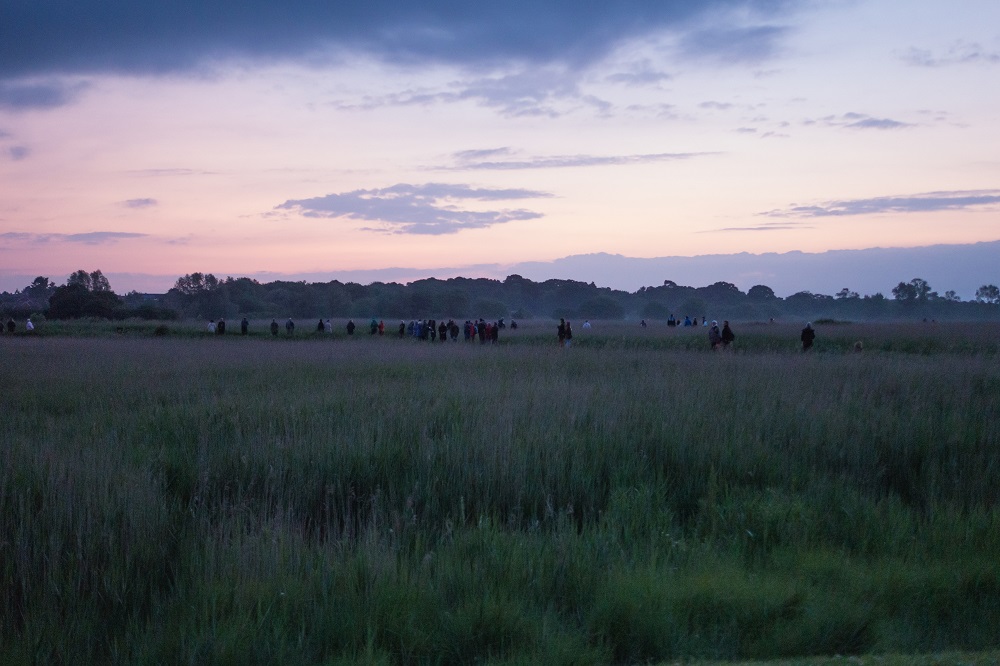 Helen joins two of us among the classical writers in praise of Esa-Pekka Salonen's Stravinsky: Myth and Ritual series with the Philharmonia, more programming that we're unlikely to see repeated on this scale. Bernard Hughes caught the St John's Smith Square collection of relative rarities culminating in the Requiem Canticles; I marvelled at the connections between Orpheus, Apollo and Persephone; and Helen's choice is the final concert of Oedipus Rex and the Symphony of Psalms.
Helen joins two of us among the classical writers in praise of Esa-Pekka Salonen's Stravinsky: Myth and Ritual series with the Philharmonia, more programming that we're unlikely to see repeated on this scale. Bernard Hughes caught the St John's Smith Square collection of relative rarities culminating in the Requiem Canticles; I marvelled at the connections between Orpheus, Apollo and Persephone; and Helen's choice is the final concert of Oedipus Rex and the Symphony of Psalms.
Other totally satisfying programmes abound. Robin Ticciati sprang back into life after a slipped disc had put him out of action for much of the year, conducting his fabulous Scottish Chamber Orchestra in the three last Mozart symphonies. Thanks to the contrast of the true original, the bittersweet Fortieth flying like an arrow in the middle of the sequence, it worked superbly. Peter Quantrill was much taken with Francois-Xavier Roth's championship of old and new with the LSO. Premiere of the year was surely James MacMillan's unpredictable Stabat Mater, embedded in another memorable concert with a cappella MacMillan and Vaughan Williams for strings. Also at the Barbican, Antonio Pappano set the hard-to-impress LSO on fire in Elgar's Second Symphony, with an equally live-wire Beethoven Violin Concerto from Nikolaj Znaider in the first half.
At the Proms, the most curious programme on paper worked brilliantly in practice, Mark Wigglesworth conducting the BBC National Orchestra of Wales and soprano of the year (again) Tamara Wilson excelling both as Wagner's Walküre Brünnhilde (strictly speaking, opera for tomorrow's choice) and in Tippett's A Child of Our Time (definitely oratorio, and decidedly for today).
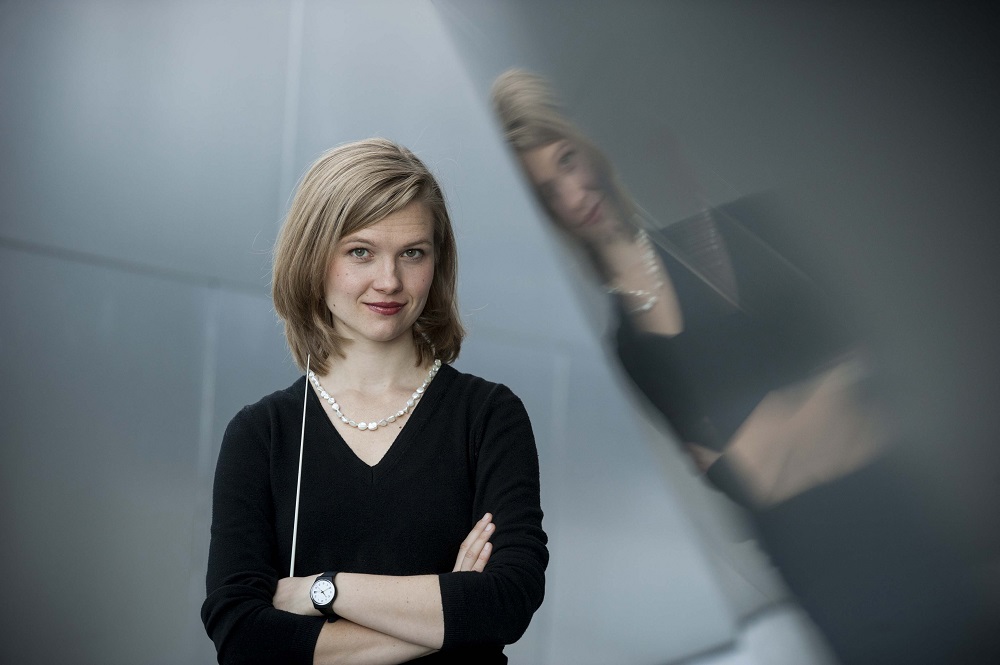 Alexandra Coghlan's concert of the year is Mirga Gražinytė-Tyla's London debut as principal conductor of the City of Birmingham Symphony Orchestra; Richard Bratby was one of the few critics to catch Mirga's crucial test concert in Brum at the start of the year (the conductor pictured above by Vern Evans). Fast forwarding again to the Proms, Simon Rattle, whose CBSO Mahler had been such a beacon, showed how far you can still go with this composer given an orchestra of supreme refinement like the Berlin Philharmonic in a revelatory Seventh Symphony.
Alexandra Coghlan's concert of the year is Mirga Gražinytė-Tyla's London debut as principal conductor of the City of Birmingham Symphony Orchestra; Richard Bratby was one of the few critics to catch Mirga's crucial test concert in Brum at the start of the year (the conductor pictured above by Vern Evans). Fast forwarding again to the Proms, Simon Rattle, whose CBSO Mahler had been such a beacon, showed how far you can still go with this composer given an orchestra of supreme refinement like the Berlin Philharmonic in a revelatory Seventh Symphony.
A final Proms choice: the National Youth Orchestra of Scotland had the edge on its Great British counterpart only by virtue of its conductor (Ilan Volkov) and the best concerto performance I heard this year, young pianist Pavel Kolesnikov's championship of Tchaikovsky's Second. The NYOGB's real triumph came earlier in the year, under the superficially insane but profoundly musical guidance of Kristjan Järvi (sorry, but we have to see this photo, below, of the youngest Järvi levitating by Jason Alden once again).
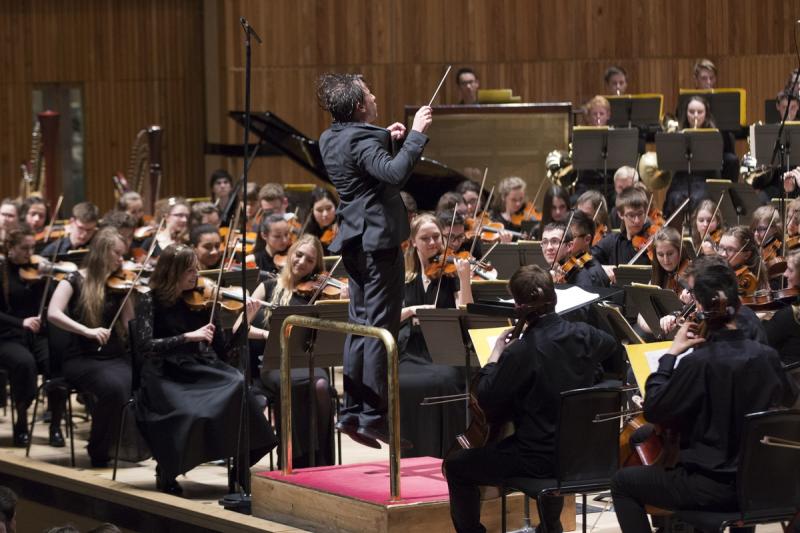 Every recent year has been a beacon for youth, and this one has shown things are getting even better across the board, with one very special sea-change. Sheku Kanneh- Mason's Haydn may have been a triumph of artistry over the mere prettiness inherent in the C major Concerto, but the Shostakovich concertos are the ones I want to hear him play live; the BBC Young Musician final (Kanneh-Mason pictured below with Mark Wigglesworth by Mark Allen) was as electrifying a performance of the First, post-Rostropovich, as any I've heard. No harm in in repeating what I wrote about the Haydn - he's not just BBC Young Musician of 2016 but player of the year, period.
Every recent year has been a beacon for youth, and this one has shown things are getting even better across the board, with one very special sea-change. Sheku Kanneh- Mason's Haydn may have been a triumph of artistry over the mere prettiness inherent in the C major Concerto, but the Shostakovich concertos are the ones I want to hear him play live; the BBC Young Musician final (Kanneh-Mason pictured below with Mark Wigglesworth by Mark Allen) was as electrifying a performance of the First, post-Rostropovich, as any I've heard. No harm in in repeating what I wrote about the Haydn - he's not just BBC Young Musician of 2016 but player of the year, period.
A previous winner, Martin James Bartlett is keeping a low profile as he continues his studies, but dazzled a packed church at the Southrepps Festival in deepest Norfolk leading a hyper-vivacious performance of Mendelssohn's First Piano Trio. For me, it was a year of revelations in Mendelssohn's chamber music; I only caught three of the six string quartets from the engaging Americans of the Calidore Quartet at the East Neuk Festival, but fell in love with each one.
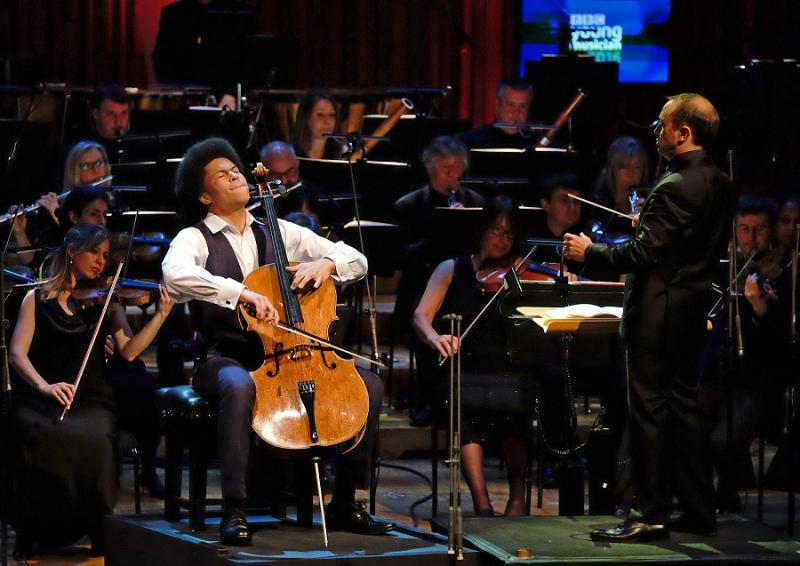
For the second year running at Estonia's Pärnu Music Festival, the middle of the Järvi conducting clan, Paavo, pulled off more high-level interpretations with what is now the Estonian Festival Orchestra, a superband now at the level of their Lucerne counterparts during the Abbado years. The orchestral highlight was an unbearably intense Shostakovich Sixth Symphony. But there was an equal wonder, as in 2015, in the army of generals' annual chamber concert, namely principal clarinettist Matthew Hunt's dancing, shrieking performance of Bartók's Contrasts with violinist Triin Ruubel and pianist Sophia Rahman. Back in London, Hunt's performance of the Mozart Clarinet Concerto with a fine orchestra of students and graduates was predictably superlative.
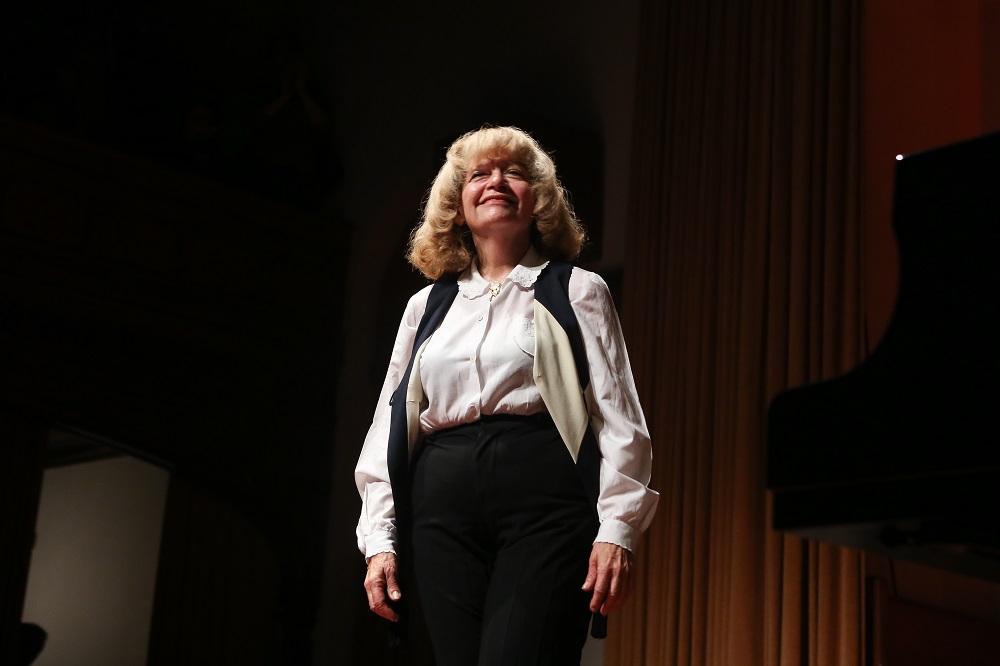 It was a revelation to hear Turkish pianist Idil Biret, at 75 still possessed of phenomenal stamina and memory, play a packed programme of 20th century music in the haven of the Bosphorus University as part of her Istanbul Music Festival marathon (pictured above by Ali Guler at the end of the concert). What an honour subsequently to interview the happiest musician I've ever met. A later flit to the D-Marin Festival near Bodrum gave me an insight into a popular phenomenon in Turkey, Fazil Say's massive Nâzım Oratorio based on the earthy poetry of the great Hikmet - a now-mythic figure not much in favour with the current regime.
It was a revelation to hear Turkish pianist Idil Biret, at 75 still possessed of phenomenal stamina and memory, play a packed programme of 20th century music in the haven of the Bosphorus University as part of her Istanbul Music Festival marathon (pictured above by Ali Guler at the end of the concert). What an honour subsequently to interview the happiest musician I've ever met. A later flit to the D-Marin Festival near Bodrum gave me an insight into a popular phenomenon in Turkey, Fazil Say's massive Nâzım Oratorio based on the earthy poetry of the great Hikmet - a now-mythic figure not much in favour with the current regime.
At the other end of the scale, the highlight for me of the two days I caught of Leif Ove Andsnes' first Rosendal Festival was to watch three remarkable artists rehearsing Schumann's Märchenerzählungen in one of the beautiful rooms in the manor house between the Hardanger Fjord and mountain waterfalls. I would be gone by the time of the performance proper, but it was a revelation to see Andsnes, clarinettist Sharon Kam and young Norwegian viola-player Eivind Holtsmark Ringstad in passionate discussion of a fascinating masterpiece I was hearing for the first time, and to find out more about how chamber music is made.
 Andsnes, whose achievements this year have been matched by pianists of very different temperament like Aimard and Jeremy Denk in a Wigmore tour de force of the piano literature (Gavin Dixon's choice), has such an instinct for the conjunction of performance and spirit of place; it was also a privilege to hear him and two junior colleagues give two concerts in the Dulwich Picture Gallery, in conjunction with the revelatory exhibition of Norwegian artist Nikolai Astrup. Most delightful event in a special place would have to be a youthful orchestra's pitch-perfect performance of Mendelssohn's complete A Midsummer Night's Dream music with nearly all the play in Middle Temple Hall. Let's hope 2017 sees many more of these site-specific phenomena, with music complementing art and architecture, but (please note) not in competition; the ear and the eye can't digest both at once.
Andsnes, whose achievements this year have been matched by pianists of very different temperament like Aimard and Jeremy Denk in a Wigmore tour de force of the piano literature (Gavin Dixon's choice), has such an instinct for the conjunction of performance and spirit of place; it was also a privilege to hear him and two junior colleagues give two concerts in the Dulwich Picture Gallery, in conjunction with the revelatory exhibition of Norwegian artist Nikolai Astrup. Most delightful event in a special place would have to be a youthful orchestra's pitch-perfect performance of Mendelssohn's complete A Midsummer Night's Dream music with nearly all the play in Middle Temple Hall. Let's hope 2017 sees many more of these site-specific phenomena, with music complementing art and architecture, but (please note) not in competition; the ear and the eye can't digest both at once.
Share this article
more Classical music
 Bell, Perahia, ASMF Chamber Ensemble, Wigmore Hall review - joy in teamwork
A great pianist re-emerges in Schumann, but Beamish and Mendelssohn take the palm
Bell, Perahia, ASMF Chamber Ensemble, Wigmore Hall review - joy in teamwork
A great pianist re-emerges in Schumann, but Beamish and Mendelssohn take the palm
 First Persons: composers Colin Alexander and Héloïse Werner on fantasy in guided improvisation
On five new works allowing an element of freedom in the performance
First Persons: composers Colin Alexander and Héloïse Werner on fantasy in guided improvisation
On five new works allowing an element of freedom in the performance
 First Person: Leeds Lieder Festival director and pianist Joseph Middleton on a beloved organisation back from the brink
Arts Council funding restored after the blow of 2023, new paths are being forged
First Person: Leeds Lieder Festival director and pianist Joseph Middleton on a beloved organisation back from the brink
Arts Council funding restored after the blow of 2023, new paths are being forged
 Classical CDs: Nymphs, magots and buckgoats
Epic symphonies, popular music from 17th century London and an engrossing tribute to a great Spanish pianist
Classical CDs: Nymphs, magots and buckgoats
Epic symphonies, popular music from 17th century London and an engrossing tribute to a great Spanish pianist
 Sheku Kanneh-Mason, Philharmonia Chorus, RPO, Petrenko, RFH review - poetic cello, blazing chorus
Atmospheric Elgar and Weinberg, but Rachmaninov's 'The Bells' takes the palm
Sheku Kanneh-Mason, Philharmonia Chorus, RPO, Petrenko, RFH review - poetic cello, blazing chorus
Atmospheric Elgar and Weinberg, but Rachmaninov's 'The Bells' takes the palm
 Daphnis et Chloé, Tenebrae, LSO, Pappano, Barbican review - lighting up Ravel’s ‘choreographic symphony’
All details outstanding in the lavish canvas of a giant masterpiece
Daphnis et Chloé, Tenebrae, LSO, Pappano, Barbican review - lighting up Ravel’s ‘choreographic symphony’
All details outstanding in the lavish canvas of a giant masterpiece
 Goldscheider, Spence, Britten Sinfonia, Milton Court review - heroic evening songs and a jolly horn ramble
Direct, cheerful new concerto by Huw Watkins, but the programme didn’t quite cohere
Goldscheider, Spence, Britten Sinfonia, Milton Court review - heroic evening songs and a jolly horn ramble
Direct, cheerful new concerto by Huw Watkins, but the programme didn’t quite cohere
 Marwood, Power, Watkins, Hallé, Adès, Bridgewater Hall, Manchester review - sonic adventure and luxuriance
Premiere of a mesmeric piece from composer Oliver Leith
Marwood, Power, Watkins, Hallé, Adès, Bridgewater Hall, Manchester review - sonic adventure and luxuriance
Premiere of a mesmeric piece from composer Oliver Leith
 Elmore String Quartet, Kings Place review - impressive playing from an emerging group
A new work holds its own alongside acknowledged masterpieces
Elmore String Quartet, Kings Place review - impressive playing from an emerging group
A new work holds its own alongside acknowledged masterpieces
 Gilliver, LSO, Roth, Barbican review - the future is bright
Vivid engagement in fresh works by young British composers, and an orchestra on form
Gilliver, LSO, Roth, Barbican review - the future is bright
Vivid engagement in fresh works by young British composers, and an orchestra on form
 Josefowicz, LPO, Järvi, RFH review - friendly monsters
Mighty but accessible Bruckner from a peerless interpreter
Josefowicz, LPO, Järvi, RFH review - friendly monsters
Mighty but accessible Bruckner from a peerless interpreter
 Cargill, Kantos Chamber Choir, Manchester Camerata, Menezes, Stoller Hall, Manchester review - imagination and star quality
Choral-orchestral collaboration is set for great things
Cargill, Kantos Chamber Choir, Manchester Camerata, Menezes, Stoller Hall, Manchester review - imagination and star quality
Choral-orchestral collaboration is set for great things

Add comment